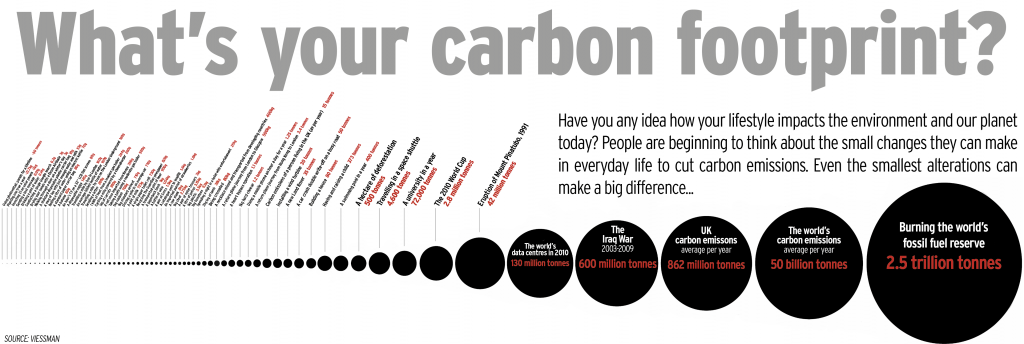Over the past 30 years, the UK has become measurably hotter, wetter and sunnier.
2020 was the UK’s third warmest year on record as well as the 5th wettest and the 8th sunniest. It’s the first year to be in the top ten in all three categories. The UK could see temperatures reaching above 40 degrees.
The pattern is very clear – the more carbon society pumps out, the more the climate will change.
Greenhouse gases are already too high for humanity to have a manageable future.
Things that we do and buy every day add up to create an enormous amount of carbon and it’s a growing problem that cannot be ignored.
So how much carbon do you make when you boil a kettle? Or send a text message?
What will turning a light off actually do? The answer is, quite a lot – especially if all households around the world do the same.
For an insight on the effects of your own carbon footprint, zoom in on this eye-opening graphic – What’s your carbon footprint?
What are we worrying about?
An average home uses 16,000 kWh each year for heating = 3.9t carbon (using a good gas boiler)
An average car covers 7,400 miles per year = 5.3t carbon (mileage from RAC foundation)
A return flight from London to Hong Kong = 3.4t carbon.
What does this mean?
In short, worry about your choice of car and how you power and heat your home – and never get in an aeroplane!
Planting just a single tree a year will absorb 21.7kg of carbon annually.
Woodlets plants 1.18 million trees a year – that’s a whopping 25,606 tonnes of carbon absorbed from the atmosphere every year.
One kWh of heat from a modern gas boiler adds up to 244g of carbon. Whereas every kWh of Woodlets’ energy saves at least 95% of your carbon.
Things to change at home
- Turn off your lights when you’re not in the room.
- Close your doors and windows to keep your heat in
- Insulate your home – make sure your home is properly insulated and draught-proofed.
- Invest in renewables – harness renewable energy sources such as solar panels and biomass boilers
- Change your boiler – replace your old boiler with a new, energy-efficient biomass version. This will help you lower your emissions and save you money in the long-term – for a detached house this could be as much as £305 a year.
By switching to biomass, the average household can save as much as 12 tonnes of carbon each year.

